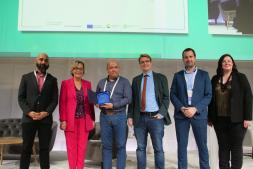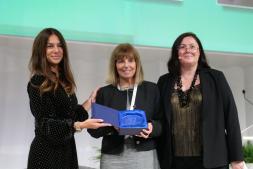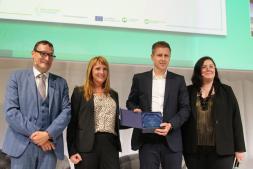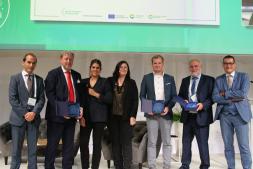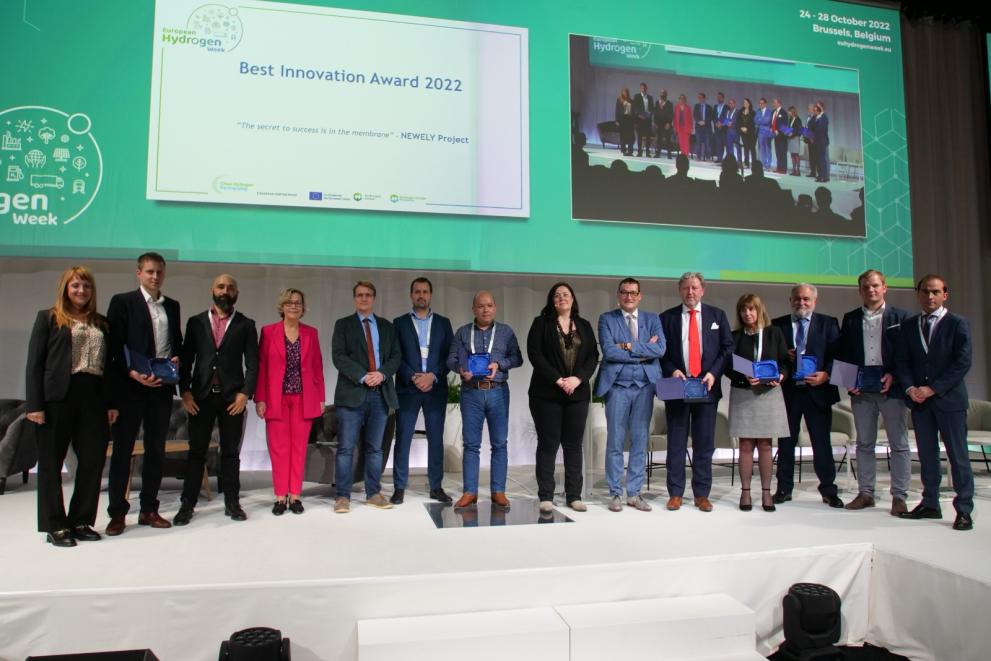
The Clean Hydrogen Partnership awards, announced during the European Hydrogen Week in Brussels on 26 October 2022, celebrate projects that have achieved excellence in clean hydrogen technologies research and innovation.
Mirela Atanasiu, who is head of the Operations and Communications unit at the Clean Hydrogen Partnership, said the awards had already become a tradition for the public-private organisation. Now in their fifth year, the awards provide an added incentive for project beneficiaries to bring research and innovation to the market.
This year’s award categories recognise the best innovation, success story, project outreach and, for the first time, the recently established European hydrogen valleys.
The finalists for the best innovation awards were selected by the partnership, based on the results in the European Commission’s EU Innovation Radar Platform. The public then voted for the winning one. The Clean Hydrogen Partnership selected the winning outreach and valley projects.
Best Innovation Award electrolysers – the engines of green power
The winner was the novel anion exchange membrane developed by the NEWELY project. The innovation received 609 votes (74 %) out of 823 cast.
Project coordinator Aldo Gago said the consortium aimed to develop a new anion-exchange membrane water electrolyser (AEMWE) that is cheaper and more efficient than what is currently available. The consortium focused on improving three elements: the membrane, electrode, and cell design and stack.
“The membrane is a big innovation, but it’s only when we combine all three elements that we see the true potential of AEMWE.”
The project developed a 2 kW five-cell prototype. The membrane has very good mechanical stability and is set to become the most efficient and cost-competitive AEMWE. AEMWEs combine the best features of alkaline and polymer electrolyte water electrolysers.
Signe Ratso, Acting Director-General for Research and Innovation at the European Commission, who presented the award for Best Innovation, said she has seen hydrogen reach the status of mainstream technology, from being a niche idea, and that it will continue to play an increasingly important role in the green energy transition.
“Hydrogen will become one of the central pillars of our future clean energy system. Investment in hydrogen R&I is crucial to speed up this deep industrial and societal transition. The Best Innovation Award of the Clean Hydrogen Partnership puts the spotlight on innovative and highly promising solutions that will accelerate this transformation.”
Best Success Story: advancing membrane technology
The GAIA project won the Best Success Story with 523 votes (47 %) of the 1 122 total votes cast by the public.
GAIA developed and tested advanced electric vehicle fuel cell components that meet stringent durability and performance requirements, taking the technology another step closer to commercial deployment and helping to decarbonise the transport sector.
Project coordinator Deborah Jones accepted the award.
“This is recognition for me of the dedication and commitment of an excellent project team. The target almost seemed aspirational at the beginning,” she said. “Without the funding of the Clean Hydrogen Partnership, this would not have happened. It was a truly outstanding collaboration between researchers.”
The project’s automotive membrane electrode assemblies (MEAs) achieved a 6 000-hour lifetime and a leading power density of 1.8 W/cm2 at 0.6 V in full-size cell short-stacks.
A techno-economic evaluation of the technology developed by the team still needs to be completed to determine how the GAIA MEA measures up to the ambitious EUR 6/kW cost target.
Best Outreach: reaching out and making waves
The SHIP FC project won the Best Outreach Award, which recognises EU funding beneficiaries who communicate effectively about their project.
SHIP FC is making the case for zero-emission propulsion for large, long-range vessels. A modular 2 MW fuel cell using ammonia as fuel is being tested on a large construction vessel for at least 3 000 hours over one year. Socio-technical models and analysis will be performed and feasibility studies conducted on other vessels.
“Without the support of the Clean Hydrogen Partnership, there wouldn’t be a project,”
Tore Boge (Project Coordinator) said in accepting the award. “This is a long story of innovation from the Norwegian maritime industry, coupled with hydrogen innovation, he continued.”
Bart Biebuyck, Executive Director of the Clean Hydrogen Partnership, praised the project for its work in a challenging environment.
“We have a lot of ship projects and they are struggling because it’s a difficult sector to decarbonise,” he said.
Some of the project’s outreach achievements included the attendance at the official project start by senior Norwegian politicians, including former minister of climate and the environment, Ola Elvestuen; representatives from the International Maritime Organisation and the Marine Environment Protection Committee. The event was broadcast on national TV.
The project was also presented at numerous conferences and industrial fairs and featured in the European Maritime Transport Environmental Report 2021 and the European Maritime Safety Agency report. It also has an active Linkedin account.
European H2 Valley 2022 Award: a triple valley success
The three winning valleys are HEAVENN in the Netherlands, Basque Hydrogen Corridor in Spain (BH2C), and eFarm in Germany.
Pauline Rouch, Head of Cabinet at the Directorate-General for Research and Innovation, handed out the award: “Although the concept of hydrogen valleys is relatively recent, it was high time to honour the outstanding efforts of the communities working behind the scenes to bring technology, innovation and entrepreneurship together. The winners today will be an inspiration for many, she said.”
Six criteria were used to identify the winning valleys: the extent of value chain coverage, hydrogen production volume, the variety of hydrogen end uses, project finalisation, the stakeholder landscape, and project innovativeness.
Accepting the award, José Ignacio Zudaire, president of the Basque Hydrogen Corridor (BH2C) project consortium said: “This award motivates us to continue our work for the new hydrogen economy. The cornerstone of this project is to become a region with net zero emissions by 2050, while maintaining the weight of the industrial sector in the GDP.”
Director of hydrogen strategy at the New Energy Coalition, Patrick Cnubben, accepted the award on behalf of the HEAVENN consortium.
“This project functions as a magnet. It creates more projects. We need to make this hydrogen promise work. HEAVENN is the start,” he said.
The Clean Hydrogen Partnership and its predecessor, the FCH JU, started working on the concept of hydrogen valleys in 2017. Currently, 38 European hydrogen valleys at different stages of development are part of the Mission Innovation Hydrogen Valleys Platform. Of these, 17 have reached financial investment decision level, an important step for project realisation in the near term.
Details
- Publication date
- 3 November 2022
- Author
- Clean Hydrogen Joint Undertaking

